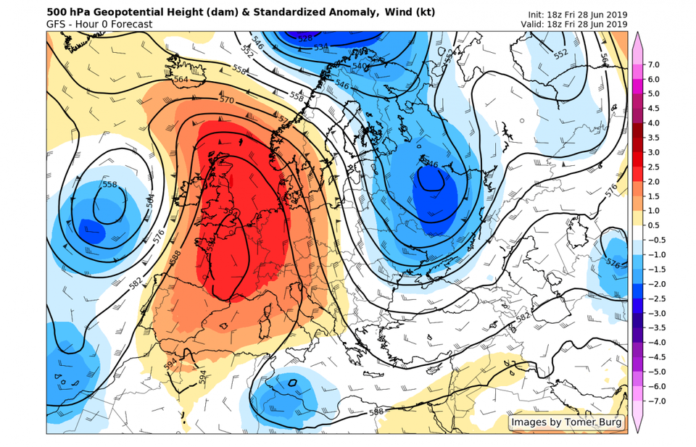Summer heatwaves with temperatures in the high 30’s could be part of a normal summer in future years according to scientists.
There is a clear link between climate change and heatwaves. What we are experiencing today is an extreme, record-breaking heatwave event. But as the climate warms, these extreme events will become even hotter. In other words, the sort of heatwaves we are experiencing today could become more frequent in future years as the climate warms.” says Dr Jon Shonk, research scientiest at the University of Reading adding
“While we cannot directly link a single heatwave event to climate change, we can look at trends in heatwaves. We have been experiencing warmer heatwave conditions in the last few years, such as the long, hot spell in June and July 2018.”
The reason for the present spell of hot weather is the arrival of hot air from over Europe. France is in the grip an extreme heatwave at the moment, with hot air heading north from Africa. This air has been influencing most of western Europe over the past few days, but yesterday an approaching low pressure system from the west has southerly winds ahead of it, which pulled the hot air from France over much of the UK.
“The uncomfortably hot few days and nights should serve as a reminder of what we, as a country, need to do to prepare ourselves for more heatwaves in the future.” says Professor Hannah Cloke, a natural hazards researcher at the University of Reading,
“First of all, we must take the entirely achievable steps to stop making this problem worse. Unless we follow up on our commitments to tackle climate change, lethal heatwaves could become the norm in Britain by the middle of the century. And of course, that’s just one tiny part of the impacts of climate change, in the UK and globally, that will have a major impact on all our lives.
“Just to cope with the warmer climate that we are already experiencing, we have to make changes to the way we live our lives. We need to adapt our homes and buildings to stay cool, change our activities to stay out of harm’s way, and take action to protect the most vulnerable people.
“We have good forecasts of heatwaves, but need to be smarter about how we act on early warnings. Key authorities such as councils, hospitals, fire brigades and anyone looking after core infrastructure must act quickly to make sure that they keep vital services going, and don’t make problems such as air pollution any worse.”







